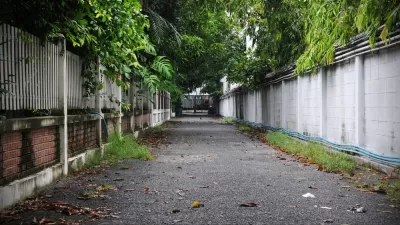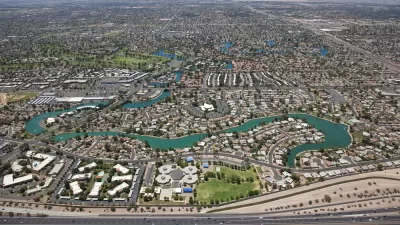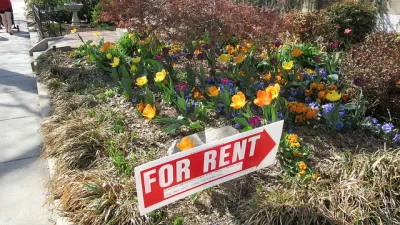A new HUD survey could help change the way the federal government defines the "suburban"—a notoriously tricky proposition.

The U.S. Department of Housing and Urban Development's 2017 American Housing Survey (AHS) included a question about whether respondents consider their neighborhoods to be urban, suburban, or rural, hoping to shed more light on one of the toughest questions in planning and development: What's a suburb, exactly?
According to a webpage hosted by the Office and Policy Development and Research, "HUD obtained responses to the neighborhood description question from nearly 76,000 households, including approximately 2,150 households in each of 25 large metropolitan areas," making it the largest ever survey on this question, expanding on a previous effort by Trulia. (The Pew Research Center has also undertaken a similar survey effort.)
The webpage sharing the new survey data also offers insights into why the motivations behind the survey, and one is a telling revelation about the disconnect between public policy on issues of land use and development compared to the realities of community for most Americans. "HUD wanted to understand the extent to which existing federal definitions of urban and rural obscure the stylized fact that half of Americans live in a suburban setting." HUD's effort to reveal the way federal definitions obscure the realities of American development patterns could inform reform in the next generation of federal definitions.
"To date, HUD has published two products from this data. First, HUD created a series of summary tables summarizing some basic results. Second, HUD and coauthors created the Urbanization Perceptions Small Area Index, which classified each census tract as urban, suburban, or rural based on the 2017 AHS data."
FULL STORY: 2017 AHS Neighborhood Description Survey

Maui's Vacation Rental Debate Turns Ugly
Verbal attacks, misinformation campaigns and fistfights plague a high-stakes debate to convert thousands of vacation rentals into long-term housing.

Planetizen Federal Action Tracker
A weekly monitor of how Trump’s orders and actions are impacting planners and planning in America.

In Urban Planning, AI Prompting Could be the New Design Thinking
Creativity has long been key to great urban design. What if we see AI as our new creative partner?

King County Supportive Housing Program Offers Hope for Unhoused Residents
The county is taking a ‘Housing First’ approach that prioritizes getting people into housing, then offering wraparound supportive services.

Researchers Use AI to Get Clearer Picture of US Housing
Analysts are using artificial intelligence to supercharge their research by allowing them to comb through data faster. Though these AI tools can be error prone, they save time and housing researchers are optimistic about the future.

Making Shared Micromobility More Inclusive
Cities and shared mobility system operators can do more to include people with disabilities in planning and operations, per a new report.
Urban Design for Planners 1: Software Tools
This six-course series explores essential urban design concepts using open source software and equips planners with the tools they need to participate fully in the urban design process.
Planning for Universal Design
Learn the tools for implementing Universal Design in planning regulations.
planning NEXT
Appalachian Highlands Housing Partners
Mpact (founded as Rail~Volution)
City of Camden Redevelopment Agency
City of Astoria
City of Portland
City of Laramie





























